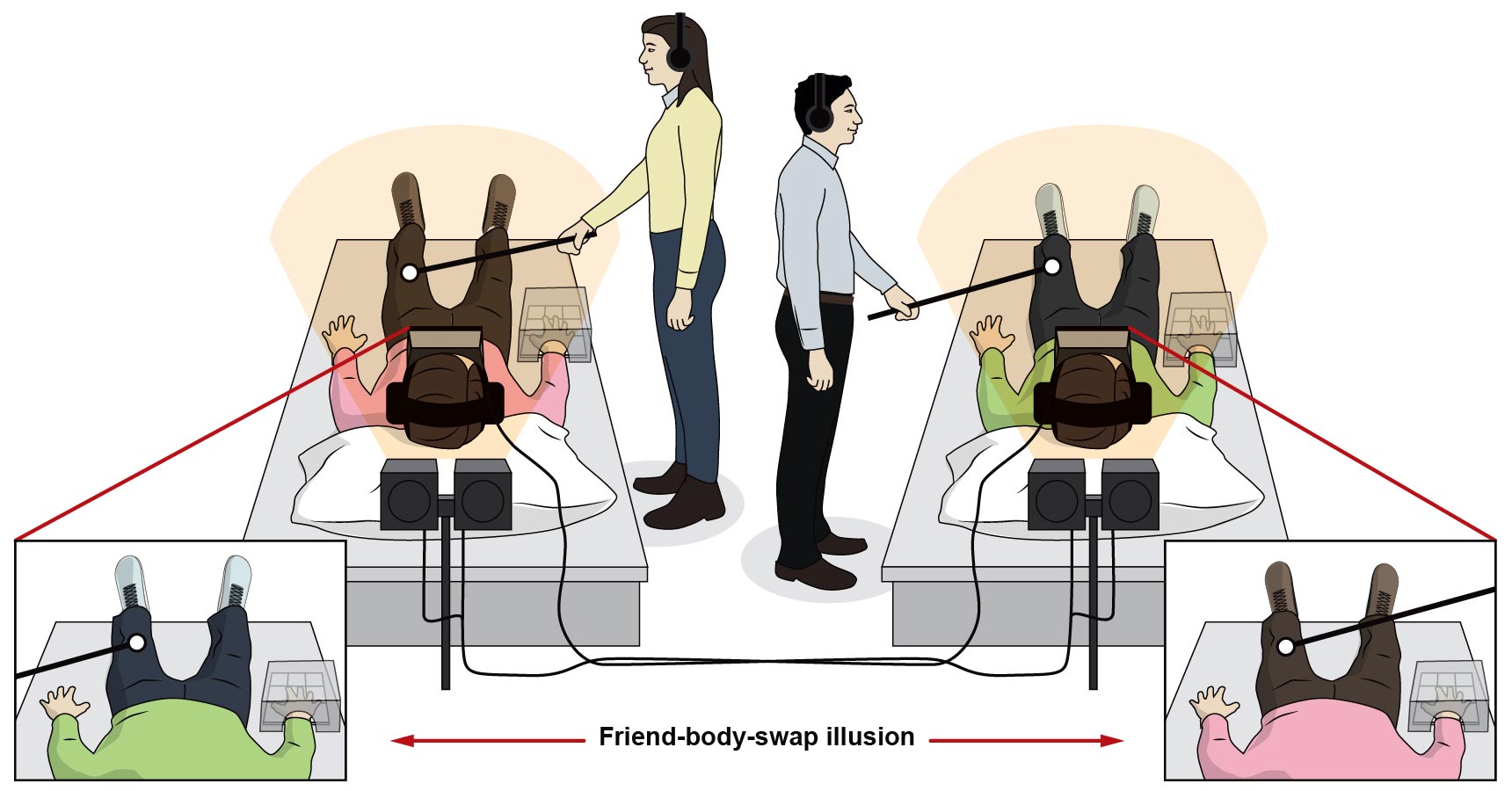

This image shows an image of the setup of the body exchange experiment. Credit: Mattias Karlen
Our sense of who we are is thought to be influenced by things like our childhood experiences, our interactions with others, and now, say researchers, our bodies. A study appears today (August 26, 2020) in the journal iScience shows that when couples of friends exchange bodies for a perceptual illusion, their beliefs about their own personalities become more similar to their beliefs about the personalities of their friends. The findings suggest that this close link between our psychological and physical sense of self is also involved in functions such as memory: if our mental self-understanding does not correspond to our physical self, our memory may be impaired.
“As a child, I used to wonder what it would be like to wake up one day in the body of another,” says first author Pawel Tacikowski, a postdoctoral researcher at Karolinska Institutet in Sweden. “A lot of kids probably have those fantasies, and I think I never grew out of it – I just changed it in my job.”

This image shows how the self-concept changes to the perceptual illusion. Credit: Pawel Tacikowski
The team of the Brain, Body, and Self Laboratory led by Henrik Ehrsson has equipped some friends with glasses that show live feeds of the other person’s body from a first person perspective. To promote the illusion, they simultaneously touched both participants on corresponding body parts so that they could also feel what they saw in the glasses. After only a few moments, the illusion generally worked; to show that it did, the researchers threatened the friend’s body with a paring knife and found that the participant broke out in sweat as if they were the one who was threatened. “Body swapping is no longer a domain reserved for science fiction movies,” says Tacikowski.
Participants were only made to feel like they were “awake in someone else’s body for a short period of time,” but that was long enough to significantly change their self-perception. Before changing the body, participants assess their friends on characteristics such as speech, cheerfulness, independence and confidence. Compared to this baseline, during the exchange they tend to rate themselves as more similar to the friend in whose body they were.

This image shows an artistic image of changing physical self-esteem while wearing the glasses. Credit: Mattias Karlen
The illusion also affects the memory. “There is a well-established finding that people are better at remembering things that are related to themselves. So, we thought that if we interfered with your self-representation during the illusion, that would generally reduce their memory performance. , ”Says Tacikowski.
And it did: illusion participants generally performed less well on memory tests. More importantly, however, participants who fully embraced their friend’s body significantly adjusted their own and their personality ratings to adjust how they rated their friend performed better on the tests than those who indicated that they detached from her body. The researchers say this may be because they had less “self-incoherence”, which means their mental and physical self-representations are still adjusted.
These findings may be important when we look at depersonalization disorder, where people feel a connection between their mental state and their bodies, and other psychiatric disorders such as depression. “We show that the self-concept has the potential to change really quickly, which brings us to potentially interesting practical implications,” says Tacikowski. “People who suffer from depression often have very rigid and negative beliefs about themselves that can be devastating to their daily functioning. Changing this illusion slightly may make those beliefs less rigid and less negative. ”
For now, however, he wants to formulate a more general framework for how the sense of self is constructed on the physical and psychological level. “Now my mind is occupied with the question of how this behavioral effect works – what the brain mechanism is,” says Tacikowski. “Then we can use this model for more specific clinical applications to develop potentially better treatments.”
###
Reference: “Perception of Our Own Body Influences Self-Concept and Self-Incoherence Impairs Episodic Memory” by Pawel Tacikowski, Marieke L. Weijs and H. Henrik Ehrsson, 26 August 2020, iScience.
DOI: 10.1016 / j.isci.2020.101429
This work was supported by the Swedish Research Council, the Torsten Söderberg Foundation, the Göran Gustafson Foundation, and the European Commission.